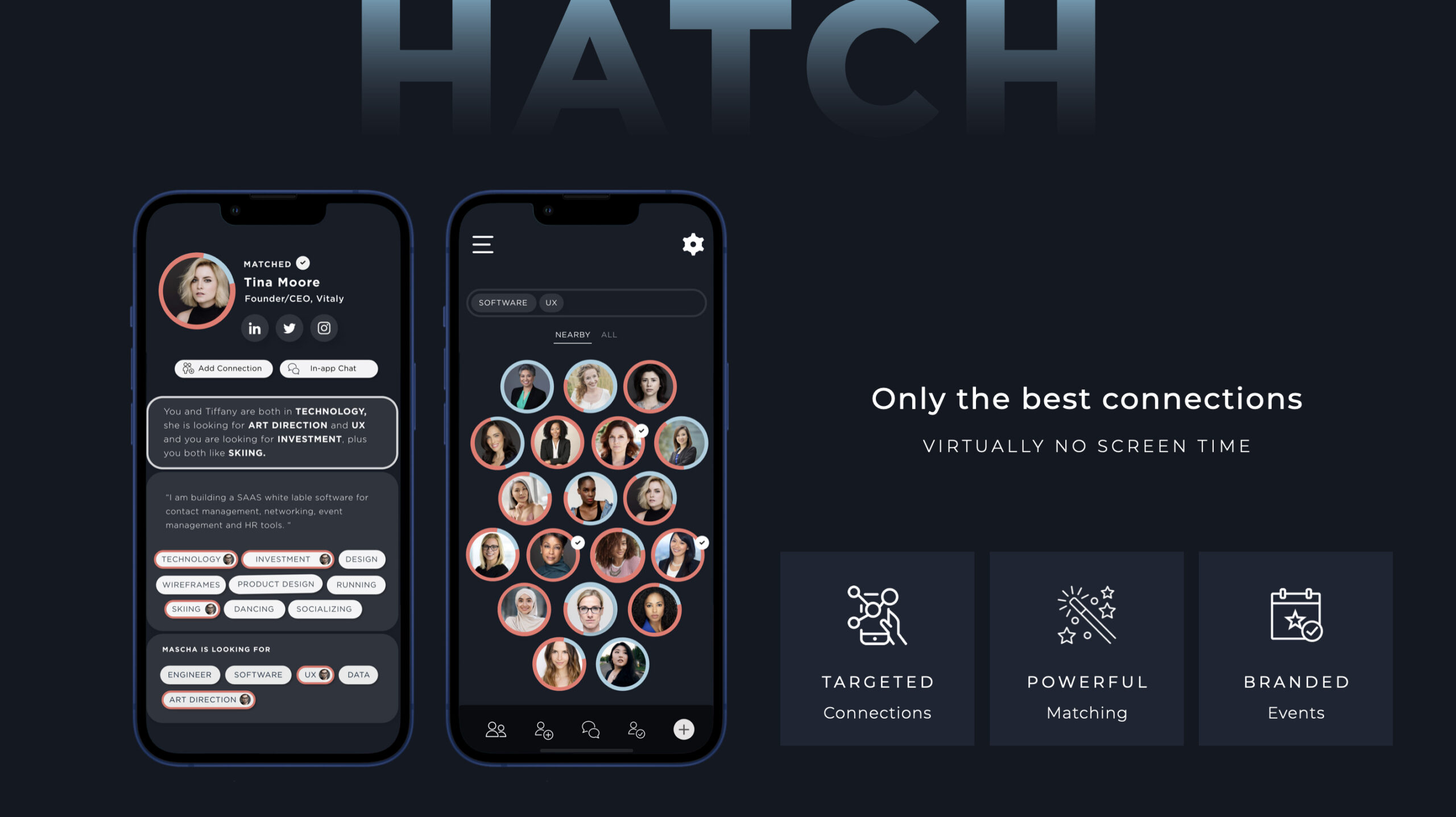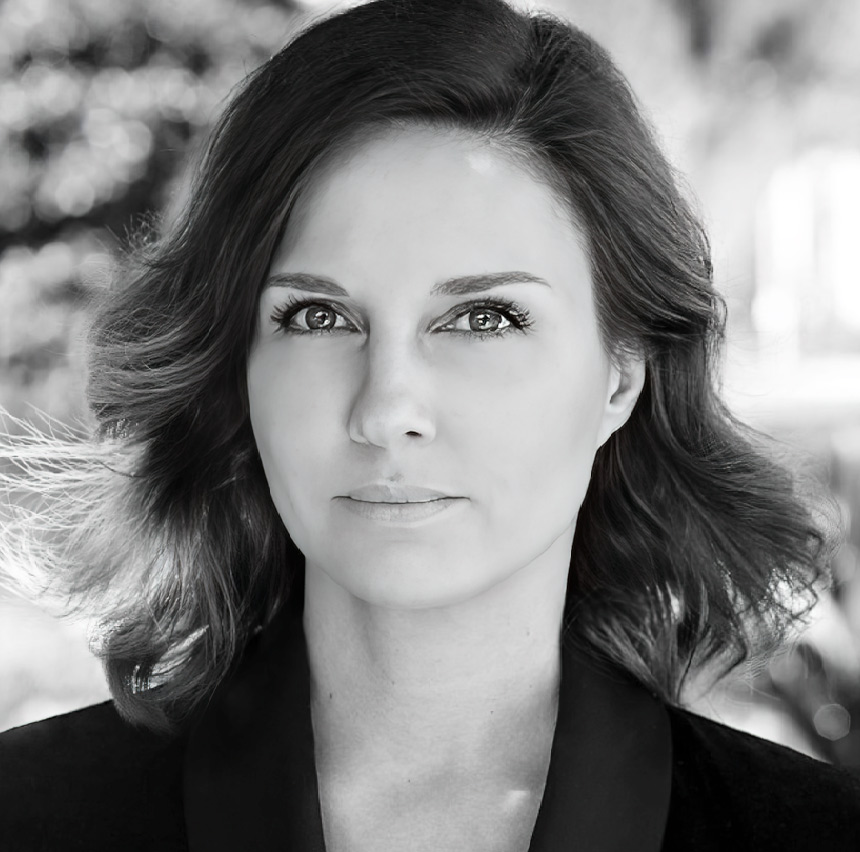It’s 9:00 AM and you receive a ping from your LinkedIn mailbox. What do you see?
For the majority of us users, it’s about five or so, automatically generated robot messages from your recent new “connections”.
It’s 2022 and humans have gotten so obsessed with the idea of automation and efficiency that they repeatedly ignore the time-bound principles of creating important, professional relationships, that is connection.
Connection is rare to find these days amidst the hundreds of apps available to us. In a way, the idea of forming relationships has really become on par with ‘a numbers game’.
In seeking the truth about how we can better foster connection in the professional space, whilst co-existing with technology, one curious creative entrepreneur sought out a solution.
Mascha Moore is the founder of Hatch, a private networking platform for entrepreneurs and investors, as well as Ms June an NFT project aimed at bringing more equality to female founders.
Mascha was able to build tools by combining her inherent visual gift with technology that would inspire the possibility of bringing back authentic connections in a digital world.
She spoke to us about the common frustrations with current networking applications and her perspective on the future of networking and collaboration.
Interviewer: You have quite a comprehensive career, having found multiple creative and tech companies related to editorial fashion. Can you walk us through how you got started with Hatch, a networking platform?

Mascha: I always had a little frustration with technology, especially regarding social interactions. I had objections as early as 2008 when Facebook and other social media outlets came out. It was an instinctual discomfort and I felt that this wasn’t a healthy way to connect.
I remember being struck when I saw a Ted Talk from Tristan Harris, who is also a part of the Netflix documentary, The Social Dilemma. I felt like someone was finally describing and pinpointing this discomfort I was feeling, and it was making a lot of sense.
That was the trigger that led me to start exploring and figuring out what a healthy user experience would be. It led to years of exploration, iteration, and obsession with user experience.
It’s a complex task because when there are constant notifications and things grabbing our attention, it’s really hard to compete by building something that’s trying to do the opposite. Instead, our focus is now more on the value we can bring.
For example, Hatch will allow people to connect with people in their area that have similar interests/goals and encourage them to meet in real life, instead of staying on the app indefinitely. It’s meant to just create that bridge, and there’s none of that swiping involved. I always thought the swiping function on dating apps to be extremely dehumanizing. There’s also a bit of vetting and securitization involved in order to sign up. That wall is in place to protect people from scammers or other disingenuous intents. Furthermore, the best thing, zero ads! Ads are terrible for user experience.
Interviewer: What’s your advice for women who are intrinsically creative and visual people but don’t exactly know how to make that profitable?
Mascha: That’s a difficult question because I’ve been in a foreign country, and I’ve always been bound by many limitations.
I think in general, business for women is quite difficult in America. I never felt as much inequality in the creative space, but I definitely feel there’s much more of it in tech.
For my creative endeavors, I always worked with large teams. Any kind of artistic production takes a village to pull off, so along the way I learned to wear many different hats and developed skills, but I mostly got my foot in the door by knowing photographers. Then I was able to build up my career from there.
I’m a very technical person naturally, so it’s fairly easy for me to toggle back and forth between my creative side and the side that needs to execute and make sure everything is in its exact place.
Interviewer: NFTs appear to be a new buzzword that many institutional investors of wary of. Can you explain why you sought out this type of model for Ms June?
Mascha: I was having a hard time with it last year when it was so hyped up. There were lots of scams out there, and I don’t buy into things that lack common sense.
However I do think with the recent crash and the several losses that are currently ensuing, there’s going to be more clarity in the space. By that I mean, what NFTs are, what it isn’t, and how they can be used.
I think NFTs can have a lot of positive utility. Such as, they can give people entry to certain special events, a fundraising tool for underprivileged entrepreneurs, and also has a utility in charity. For example, when you donate money you get a really beautiful, souvenir as a token of appreciation.
I do hope that this recent crash gives NFTs the chance to turn into something that’s meaningful and real and doesn’t feel so scammy to most of the public.
Interviewer: Do you have a theory of why large fashion brands are adopting NFTs?
Mascha: I think everyone’s exploring a bit but hasn’t quite figured out what is a good use case.
Of course, for brands, it’s a type of marketing tool, as well as part of an ongoing experiment given it is uncharted territory.
I wish that brands would lean more towards the side of telling authentic stories and giving people the feeling of access. For example, Nike traditionally has had campaigns that are very mission-driven. I think in the same way, you can use NFTs as a medium to engage with those that believe in your mission.
Interviewer: What was the overall reaction to what you were trying to build with Hatch?
Mascha: The reactions were very dismissive initially. When I first started talking about those Ted Talks with people and said how we needed to minimize screen time, people thought I was crazy.
This was when the average screen time was four hours, and now it’s seven plus on average.
I think after the 2016 election and the Facebook situation, people were slowly grasping what I was saying
There was something wrong with this.
What I believe is that if private companies like Facebook or LinkedIn are harvesting so much of our personal data, why aren’t they using it better—in a way that benefits the users?
But their way of recommendations is giving me profiles of people I went to college with or have mutual connections with.
What are the chances of those connections actually manifesting into something useful? Very slim. I believe that the best connections are the mutually beneficial ones, and that how our matching system was designed.
Interviewer: What about investors?
Mascha: It’s hard as a woman to be taken seriously, especially in the tech industry. The response is like, “Oh, you didn’t graduate from Stanford. You’re not an engineer. So why do you think you should get funding for building something like this?”
And the answer is this.
Because I’ve been so obsessed with it. I’ve been constantly iterating and perfecting the app and user experience, but there are still a lot of no’s.
So far, people that have used the product are always pleasantly surprised.
However, as a self-funded entrepreneur, there are limits to how far I can go with it.
Interviewer: What is one piece of business or life advice you would tell your younger self?
Mascha: Don’t stay silent. I plan to write a lot about that because in the past, in order to protect people and their reputations, I stayed silent on a lot of wrong behaviors. It’s the worst poison you can give yourself.
Interviewer: Can you tell us a little bit about your latest NFT project?
Masha: I designed the whole collection of NFTs with hopes to generate funding and bring awareness to issues women founders experience on their journeys. There are many pains that women face that are hard to talk about, but it’s like a common understanding.
I’m hoping my art can represent this and also be a tool for women, especially entrepreneurs, to benefit from.
Conclusion
The applications of technology are almost infinite.
Although it’s received a bad reputation in recent years due to over-exceeding screen times and being the facilitator of ingenuine interactions, it can also be used to benefit the population.
Nothing beats face-to-face interactions and technology can facilitate more opportunities to meet in person and form meaningful relationships.
That’s what Hatch aims to do: bring people with similar goals together through tech—and unlike its counterparts, it’s probably one of the few applications that encourages the least amount of user time possible.
